Steel companies in Pakistan are known for their overt branding. It is not just the often over-the-top television commercials. It is the logos and distinctive paints splashed across small steel distributors shops across Pakistan. But even by steel company standards, Agha Steel Industries Ltd., makes sure you remember who they are. At their head office located in Emerald Tower, in Karachi, the Agha Steel gray and orange logo can be found on just about every surface, including mugs and coasters.
Even Hussain Agha, the CEO of the company, sports an orange tie emblazoned with the logo. Needless to say, he is exceedingly delighted of his family business, and often punctuates his takes on the company and its growth with the phrase, ‘God has been very kind.’ Uttered by any other person, it would have come off as insincere, or even mildly sanctimonious.
And yet Agha is genuinely surprised by the company he leads. God has, indeed, been very kind to Agha Steel Industries: the just eight-year-old company produces its own steel (an achievement in Pakistan), and has managed to be included in the same breath as competitors like Amreli Steels and Mughal Iron & Steel. Between 2014 and 2017, the company’s revenue grew at a three year compounded annual growth rate (CAGR) of 33%.
And now, the company has decided to go for an initial public offering (IPO). It will be Pakistan’s third IPO of the year, after The Organic Meat Company, and TPL Trakker. The year 2020 does not seem like the kindest year, yet Agha is ever optimistic, both for the IPO, and for the company’s future.
The steel industry
First, some context. Global steel production for 2019 stood at 1,867 million tons after rising 3.4% compared to the previous year. Production, however, contracted in all regions except Asia and the Middle East. China alone increased its production to 996 million tones in 2019, and increased its share of the global crude steel industry from 50.9% to 53.3%.
In comparison, the total steel demand of Pakistan is tiny, at around 7.1 million tons annually, of which imports meet 45% of local demand. Pakistan remains an under-penetrated market: the per capita steel consumption is the second-lowest in the world at 37 kilograms per capita against the global average of 240 kg per capita.
Domestically, the steel industry in Pakistan is divided into two sub-industries: flat products (coils and sheets) and long products (rebars and billets). The long steel sector in Pakistan accounts for 75% of total steel produced in Pakistan, and has more than 600 small players that have an estimated capacity of 5 million tons.
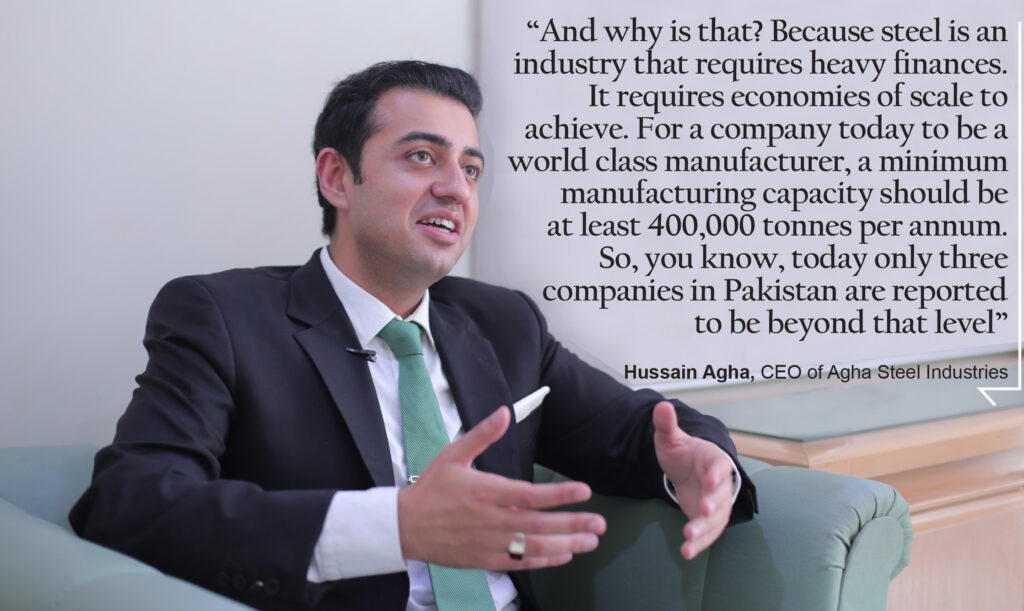
Long products are further divided into graded and ungraded. Graded accounts for 25% of long products, and are mainly produced in mini mills, which use induction furnaces, or an older form of steel production.
Ungraded is the most common form of steel production, which is basically ship breaking. In Pakistan the ship breaking industry is situated at Gadani, Balochistan, which features around 100 shipyards owned by various ship breakers. Ships are dismantled into steel scrap plates which are then sent to re-rolling mills.
There are some major problems with ship breaking. The most obvious one is that it is inefficient: the rebars made through this process are often of low quality. As customers move towards better quality and graded products, ship breaking is in decline.
But Pakistan is also one of a handful of countries in the world – along with India and Bangladesh – that even allows ship breaking to begin with. Ship breaking has massive environmental risks, allowing toxic elements to seep into the ship graveyard. It is also extremely dangerous for labourers, with fumes and explosions. It is why a labourer can expect to earn up to Rs70,000 a month – about four times the monthly minimum wage – in scrapping a ship at Gadani, though quite literally at the risk of their own life. Gadani itself is rampant with labour rights violations, just like in other developing countries.
The history of Agha Steel
Now, Hussain Agha actually represents the third generation of steel makers in his family. Hussain Agha’s grandfather was the patriarch, and started off manufacturing chain links, nails alongside with other products around the time of Partition.
But the real pioneer was Iqbal Hussain Agha who, alongside his brothers, set up the family’s steel businesses under the name of Abbas Steel, in Korangi, Karachi in the 1960s. This was a melt shop, with a re-rolling plant. The Agha Group, as it were, also expanded into the shipbreaking industry, with Abbas Shipbreaking Industries at Gadani in 1970. They were the first group in Pakistan to have an ISO Certified Green Yard.
The group did not limit its sights to steel: it also expanded into the textile industry in 1991, with Al-Abbas Fabrics, which was a hosiery, knitting and dyeing unit, which relied heavily on exports. In 2003, the group expanded into denim manufacturing with Denim International, which produces 12 million meters of fabric per annum, and four million pieces of garments, mostly shipped to the European Union and the US.
But the group never lost sight of its steel roots. On January 1, 2010, the groundbreaking of the steel manufacturing plant of Agha Steel Industries was held. The company started commercial operations exactly two years later on January 1, 2012. “I think that is a regional benchmark that was set for starting a factory of this magnitude in this short span of time,” says Agha.
Hussain Agha, the younger of Iqbal Hussain Agha’s two sons, has spearheaded the project since inception. The extraordinarily young CEO – he is only 34 – says that he recalls, as soon as he landed back in Pakistan after completing his undergraduate business degree and MBA (both from Bentley University in the suburbs of Boston), he was expected to show up in the office the very next day.
In fact, Hussain Agha finds the current business tempo the ideal time for the IPO, despite the pandemic.
First, in April, the government of Pakistan announced an incentive package for the real estate and construction industry. The industry will also have a fixed tax regime – more akin to a sales tax – instead of taxes on profits. Additionally, the central bank has asked commercial banks to allocate 5% of their total lending to the construction sector. This will hopefully improve lending in general: as it currently stands, the banks’ exposure to the sector is only at 1% of total lending. In short, demand for gray steel bars is expected to start rising rapidly.
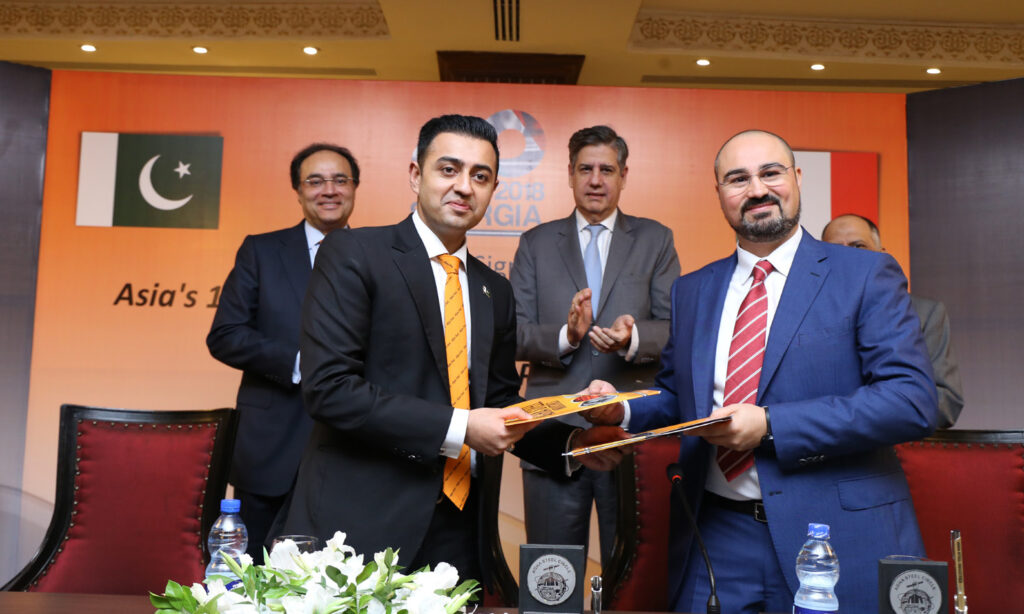
And second, with the benchmark KSE-100 index rebounding 54% from its lowest point in March 2020 to becoming Asia’s best performing stock market, valuations of stocks are off their recent lows, suggesting there may be investor appetite for a well-performing new company to list its shares on the market.
Agha Steels intends on selling 120 million shares at the floor price of Rs30 per share, with Arif Habib Ltd acting as the lead investment bank on the transaction. The maximum strike price allowed is Rs42 per share. This will constitute 20.8% of the total post IPO paid up capital of the company.
Around 75% of the total issue, or 90 million shares, will be issued through the book building process, while the remaining 25%, or 30 million shares, of the issue will be placed through retail offers to the general public. The strike price will be determined by the book building process.
Through the IPO, Agha Steels intends to raise Rs3.6 billion. An additional Rs1.7 billion from long term debt, and Rs1.7 billion from suppliers credit, will support the funding requirement. Of the total Rs7 billion, Rs2.7 billion will be set aside for plant and machinery, Rs1 billion for working capital, Rs445 million for land, Rs510 million for civil works, and Rs476 million for an air separation unit, among other expenditures.
Manufacturing capacity
Initially, the company set up a production facility at Port Qasim, on an area of 10 acres. Unlike its competitors, Agha Steels set up Pakistan’s first 40 ton EBT Electric Arc Furnace and a completely automatic straight line rolling mill. This produced rebars (reinforcing bars) and billets at an installed capacity of 120,000 metric tons per year and 250,000 tons per year, respectively. It was also among the first to set up the melting and re-rolling processes on the same premises, unusual for most steel industries at that time, which helped to cut time lags.
In 2017, the company bought an additional 17 acres of land next to the existing plot for expansion purposes, and in 2018, the company completed a ‘balancing, modernisation, rehabilitation and expansion’ activity, which is a fancy way of saying that it expanded its melting capacity from 250,000 metric tons per year to 450,000 tons per year and its rolling capacity from 120,000 tons per year to 250,000 tons per year.
In 2019, the company’s revenue was recorded at Rs10,482 million and Rs15,710 million in 2020. Profit after taxation stood at Rs768 million in 2019 and Rs1,236 million in 2020 showing healthy growth within the sector.
Agha Steel is a very different kind of company from the others. Their revenue patterns are roughly 80% institutional sales, and 20% commercial (i.e. through third-party wholesalers and distributors), whereas the other competitors generally have more than 70% in commercial sales. This allows the company to focus on higher retention segments; retail consumers are simply not their target demographic yet. Instead, Agha Steel likes to get involved in big ticket projects – like the Neelum Jhelum Hydropower Project, Bahria Town Karachi, Karachi Super Highway M9, and the Sindh Engro Coal Mining Company to name a few – where quality is paramount.
Technology
“Why is Agha Steels the leader in institutional sales? It’s because of our technology. Koi sawal hee nahin hai – we are the only manufacturers who have an electric arc furnace with 100% refined steel.” says Agha.
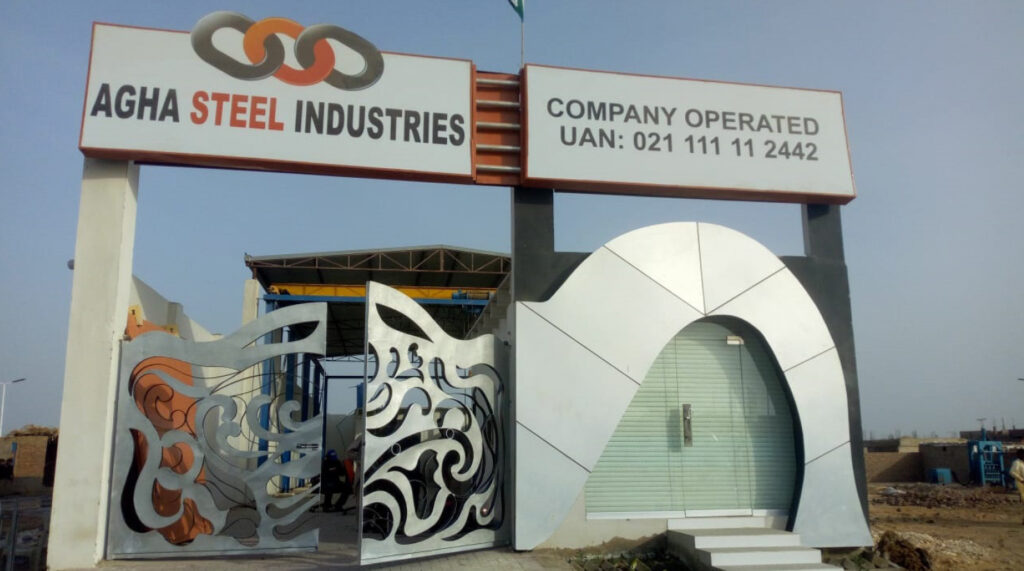
So exactly what is the electric arc furnace? It is a manufacturing facility that allows the company to produce the highest qualities of purified steel and more accurate chemistry control in the metal. Unlike traditional induction furnaces, an electric arc furnace has lower energy costs, with savings of up to 25% of total electricity cost. It is also easier to change the materials to customer preference, unlike in induction furnaces. Since it is newer, it is less labour intensive, more efficient and is more environmentally friendlier (as much as steel processing can be).
But that is nothing compared to the Mi.Da Rolling mill that Agha wants to install. In fact, part of the Rs3.6 billion of the proposed IPO proceeds will go towards financing this expansion.
Agha’s entire demeanor changes when discussing this mill. He is, after all, a huge enthusiast for the latest in steel production. It all began with a chance encounter with the Danieli Group of Italy. That particular company has been around since 1914, and was one of the first companies in Italy to manufacture electric arc furnaces. When Agha Steels wanted to expand its melting capacity from 250,000 tons to 450,000 tons, it looked to Danieli for the latest in electric arc furnace tech.
This was the company that sold the idea of a Mi.Da plant to Agha. “They said, after studying the market, this Mi.Da plant is the most optimal plant for Pakistan. Being a steel enthusiast, so much passion for steel, once I saw that plant, I couldn’t get it off my mind.” explains Agha.
According to Agha, Mi.Da plant stands for microdynamic mill, but also references King Midas, and his ‘Midas Touch’. And certainly, Agha would prefer if the new mill had the same impact. The rolling mill features a ‘direct rolling bundling’ system. What that means is that it is a continuous uninterrupted production cycle from raw material to finished product, all requiring 49% less space than a traditional mini mill.
As he explains, in traditional steel making, raw material is melted in a furnace. This leads to semi-finished goods called billets, that are then reheated and rolled. This entire process can take days. The Mi.Da mill promises to cut that time to two hours.
“This technology is a game changer; it is a disruptive technology by any standards. It is the equivalent of how before we used to have fax letters, and now we have emails,” says Agha.
Agha was partially inspired by Egyptian Steel, which acquired this plant in 2014. By Agha’s estimate, this would be the first plant in Asia with this kind of technology with DRB technology. Through the plant, the company wants to raise its re-rolling capacity from 250,000 tons to 650,000 tons per year. The plant has been shipped and is currently being installed; production is expected to start right after June of 2021.
The future
As mentioned before, Pakistan’s absurdly low per capita steel consumption means that the only way to go from here is up: the appetite for steel is just beginning.
According to a number of equity analysts, Pakistan’s per capita steel consumption is set to rise substantially, especially following the second act of the China-Pakistan Economic Corridor (CPEC).
In the report ‘From Meltdown to forging opportunities’, Fahad Hussain Khan, deputy head of research at Adam Securities, a securities brokerage firm, explains: “Rebar being one of the basic materials used in the construction industry is highly correlated with cement consumption.”
“The proportion of rebar to cement in construction varies from project to project with high rise buildings having a higher rebar to cement usage ratio… An analysis of correlation between cement demand and GDP growth reveals a historical correlation of 0.56 for the period of 1991-2015.”
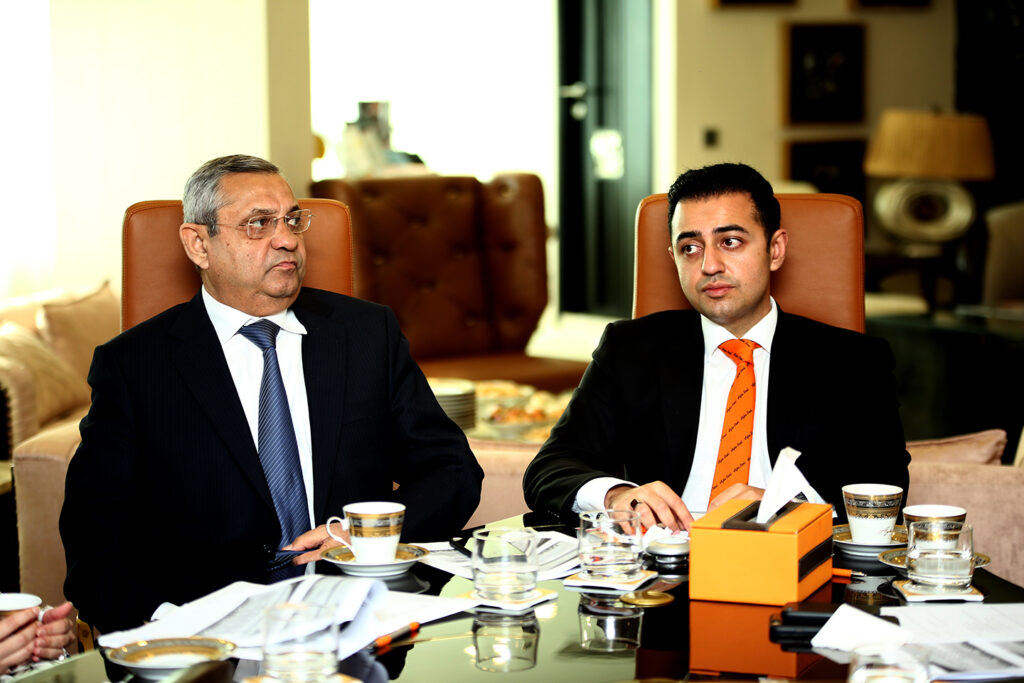
Considering the government’s Covid-19 stimulus package and its provision for the construction industry, the analyst estimates a surge in Pakistan’s steel demand in addition to CPEC related demand.
For Agha himself, the future looks bright. “The domestic market, it’s very saturated. We foresee a lot of consolidation and M&A [mergers and acquisitions] activity in the future. If you look across the globe… like in the top countries, there are only a handful of steel manufacturers, You’re never going to have 200 manufacturers as is the case in Pakistan.” explains Agha. “And why is that? Because steel is an industry that requires heavy finances. It requires economies of scale to achieve. For a company today to be a world class manufacturer, a minimum manufacturing capacity should be at least 400,000 tonnes per annum. So, you know, today only three companies in Pakistan are reported to be beyond that level.
“That shows that the industry is an infant stage. In world production, Pakistan is 0.2%. We’re like a rounding error in the world and that is simply unacceptable” Agha says.
And yet Agha remains optimistic. For one, he looks at the large demographics of Pakistan as a plus. “We have one of the largest populations, at the same time 70 to 80% of our population are under the age of 30. Most of all, more than half that population is under the age of 15. So we are going to have a lot of population coming into the workforce.”
Agha also predicts an expansion in Pakistan’s second tier cities. “When your secondary cities start growing, that’s where you would see the real growth of this country. Hyderabad, Sukkur, Nawab Shah–all these cities have been phenomenal in the growth of steel production.” says Agha. Looking forward, he predicts a jump of nearly 2 million tonnes in the next five years, which would actually be way more than Pakistan’s current supply capacity. And in that case–and if the IPO goes well–expect to see a lot more Agha branding around town. For now, it seems Agha is the ‘Rising Steel Guru of Pakistan.’




















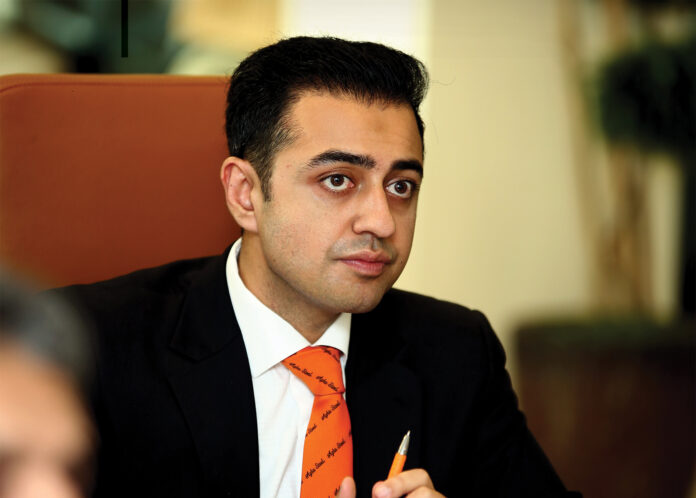





good luck
Well articulated .
Good luck Hussain and of course our opening Batsman Iqbal Agha!!
Good luck for The future of Pakistan In Sha Allah.
Good luck & best wishes for the successful completion of expansion & IPO, Insha Allah will be oversubscribed & Allah will bee more kind.
Loved this writing. Dil Khush Ho Gaya.
Congratulation Husain Bhai, on completion your project.
Good Luck!
Best of luck …. wishes May this company creates Jobs and play at vital part for Pakistan steel industry and economy…. With latest Manufacturing process.
Interesting
WISH YOU BEST OF LUCK , AGHA HUSSAIN ,PRAY YOUR INDUSTRY PROGRESSES ACCORDING TO YOUR WILL .AMEN
Wonderful article.